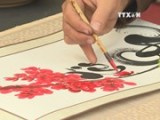Tet is a time for family. Since most Vietnamese people believe the spirits of their ancestors live alongside the living, it is usual for homes, businesses and offices to have a family shrine dedicated to the deceased that is carefully tended to throughout the year, with meals being offered, incense lit and special paper offerings burnt.
Around Tet, this custom becomes more important as the family prepares to invite all of their ancestors to ‘eat Tet’ with them. Before the big holiday, family tombs are visited, weeds are cleared and any necessary repairs are carried out.
On New Year’s Day special offerings of elaborately decorated paper, fruit, food and wine are made to the deceased and left on the altar until the fourth day of Tet. On special occasions such as ancestors’ death anniversaries or the Lunar New Year, special rites are performed to communicate with the dead.
The “five-fruit tray” on the ancestral altar during Tet Holidays symbolises the admiration and gratitude of the Vietnamese to Heaven and Earth and our ancestors and demonstrates our aspiration for a life of plenty. It demonstrates a Vietnamese percept of life, “When taking a fruit, you should think of the grower.”
At Tet, we all wait impatiently for the Giao Thua-the transition phase from the old year to the new. I remember how we would burn crackers and fireworks, a smell that reminds me of Tet.
It is popularly believed that in Heaven there are twelve Highnesses in charge of monitoring and controlling the affairs on Earth, each of them taking charge of one year. The Giao Thua is the moment to send off the old chief and welcome the new one with offerings in the open air. My grandfather, being the oldest person in the family, would practice this ceremony with simple offerings.
After this, we would all receive best wishes from the oldest person in the family, and wait for our first guests to Xong Dat (first visit to a land). Traditionally, the person who is the first visitor of the house in the new year must have a pure soul, be genuine and be a member of the family.
During the next few days, it was crucial for me to visit as many of my relatives as possible, friends and former teachers as well. As an old proverb says: “The first day of Tet is for parents, the second for friends, and the third for teachers.”












